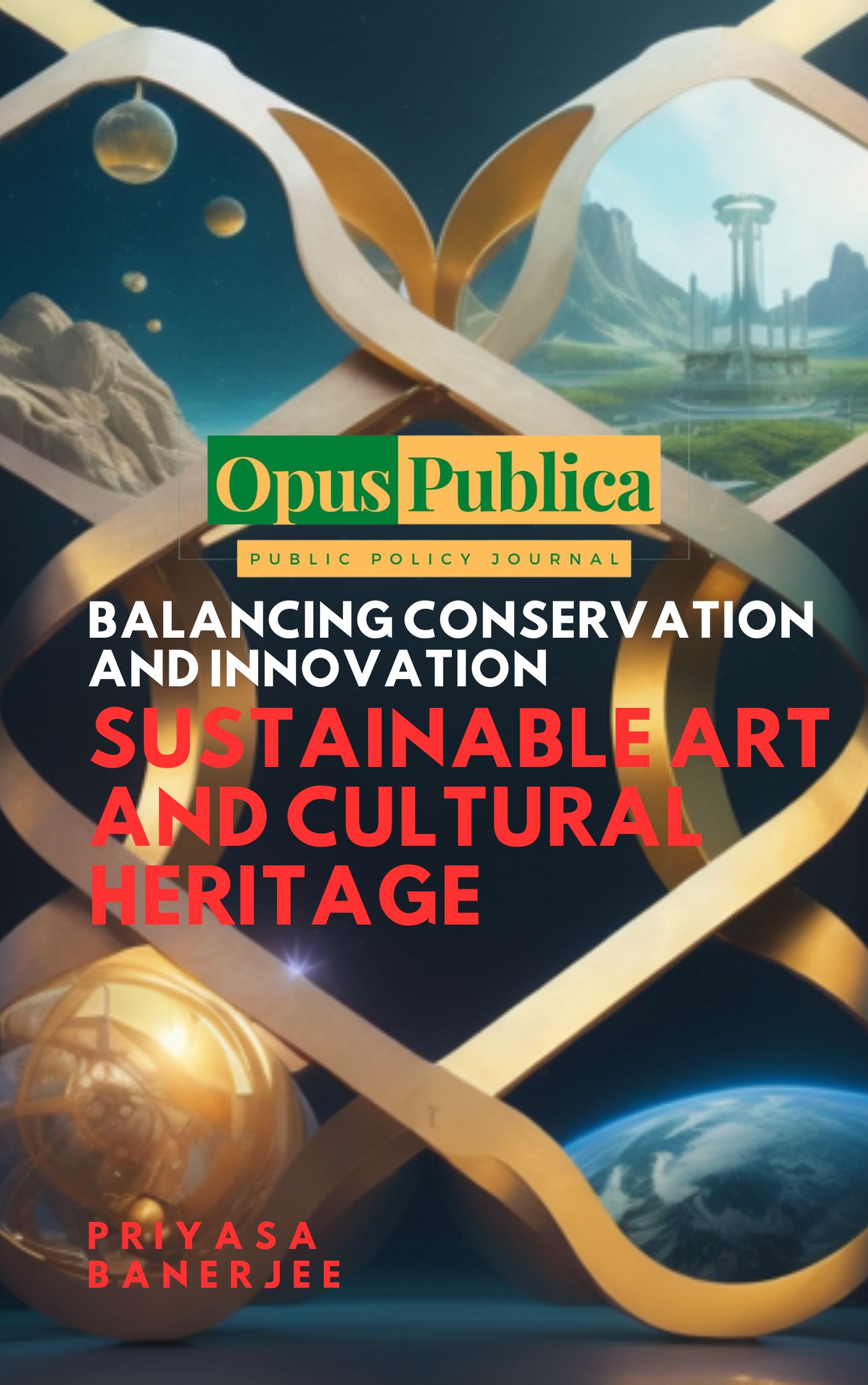Sustainable Art and Cultural Heritage: Balancing Conservation and Innovation
DOI:
https://doi.org/10.57939/expressions.v1i01.2Keywords:
sustainable art, sustainable practices, art conservation, cultural heritage preservation, environmental impact, social impact, economic impact, innovation, conservation methodologies, digital preservation, stakeholder collaboration, cultural diversity, inclusivity, policy frameworks, regulations, governance structures, case studies, international perspectives.Abstract
This research paper examines the delicate balance between conservation and innovation in the preservation of sustainable art and cultural heritage. The purpose of this paper is to shed light on the obstacles, opportunities, and potential strategies for attaining a harmonious equilibrium in this field. The research consists of a literature review, case studies, interviews, and surveys, as well as a mixed-methods approach. The findings emphasise the importance of sustainable practices in addressing conservation issues and fostering innovation. This paper examines the role of policy frameworks and regulations in encouraging the adoption of sustainable approaches. This article investigates the environmental, social, and economic benefits of sustainable art and cultural heritage practices. It also investigates the long-term effects of balancing conservation and innovation, the role of sustainable practices in promoting cultural diversity and inclusiveness, and the implications of future developments and trends. The research concludes by emphasising the need for a balance between conservation and innovation and recommending additional research and action. The paper emphasises the vital importance of sustainable art and cultural heritage practices in preserving our shared cultural heritage and embracing the changing dynamics of the modern world.

Downloads
Published
How to Cite
Issue
Section
License
Copyright (c) 2023 Expressions: A Journal of Art and Culture

This work is licensed under a Creative Commons Attribution-NonCommercial-ShareAlike 4.0 International License.
License Terms for Opus Publica Journal System
These License Terms ("Terms") govern the use of the Opus Publica Journal System ("System") provided by Opus Publica, hereinafter referred to as "Licensor." By accessing or using the System, you agree to comply with these Terms.
-
License Grant: 1.1. Licensor grants you a non-exclusive, non-transferable, worldwide license to access and use the System solely for the purpose of publishing, managing, and disseminating scholarly journals and related content. 1.2. The license is granted to individuals, institutions, or organizations, hereinafter referred to as "Licensees," and is subject to the Licensee's compliance with these Terms. 1.3. The license is limited to the functionalities and features provided by the System. It does not include any rights to modify, reproduce, distribute, or create derivative works from the System, except as expressly permitted in these Terms.
-
User Accounts: 2.1. Licensees may be required to create user accounts to access and use the System. Licensees are responsible for maintaining the confidentiality of their account credentials and for all activities that occur under their accounts. 2.2. Licensees agree to provide accurate and complete information when creating an account and to update any changes to their account information promptly. 2.3. Licensees shall not share their account credentials with unauthorized individuals or allow others to access the System using their accounts.
-
Intellectual Property: 3.1. The System, including its design, layout, software, and content, is the intellectual property of the Licensor and is protected by copyright laws and other intellectual property rights. 3.2. Licensees retain ownership of their published content but grant the Licensor a non-exclusive license to reproduce, distribute, display, and store their content through the System for the purpose of providing the services. 3.3. Licensees are responsible for ensuring that their published content does not infringe upon the intellectual property rights of any third party.
-
Use Restrictions: 4.1. Licensees shall not use the System for any unlawful, fraudulent, or unauthorized purposes. 4.2. Licensees shall not attempt to gain unauthorized access to the System or interfere with its operation, security, or functionality. 4.3. Licensees shall not modify, adapt, translate, reverse engineer, decompile, or disassemble the System or any part thereof.
-
Privacy and Data Protection: 5.1. Licensees' use of the System is subject to the Licensor's Privacy Policy, which outlines the collection, use, and disclosure of personal information. 5.2. Licensees acknowledge and agree that the Licensor may collect and process their personal information in accordance with the Privacy Policy.
-
Termination: 6.1. The Licensor reserves the right to suspend or terminate a Licensee's access to the System at any time and for any reason without prior notice. 6.2. Upon termination, Licensees shall cease all use of the System, and any provisions of these Terms that by their nature should survive termination shall continue to apply.
-
Limitation of Liability: 7.1. The System is provided on an "as-is" basis, and the Licensor makes no warranties or representations regarding its availability, functionality, or suitability for any particular purpose. 7.2. To the maximum extent permitted by law, the Licensor shall not be liable for any direct, indirect, incidental, consequential, or special damages arising out of or in connection with the use or inability to use the System.
-
Governing Law and Jurisdiction: 8.1. These Terms shall be governed by and construed in accordance with the laws of the jurisdiction where the Licensor is based. 8.2. Any disputes arising out of or in connection with these Terms shall be subject to the exclusive jurisdiction of the courts in the aforementioned jurisdiction.
-
Entire Agreement: 9.1. These License Terms constitute the entire agreement between the Licensees and the Licensor concerning the use of the System, superseding any prior agreements or understandings, whether written or oral.
By accessing and using the Opus Publica Journal System, you acknowledge that you have read, understood, and agreed to these License Terms.
